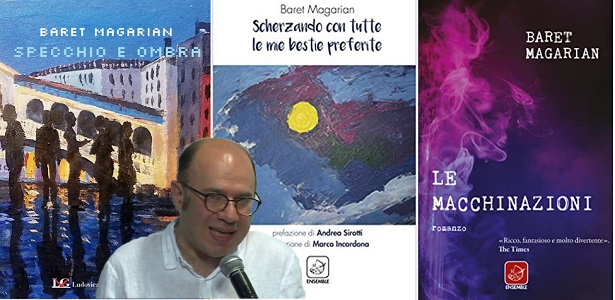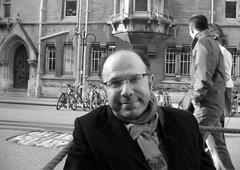 Interview by Tiziano Thomas Dossena
Interview by Tiziano Thomas Dossena
Baret Magarian is of Armenian extraction, from London, and lives in Florence, Italy. His creative writing career started at an early age when he found it convenient to make up school history essays rather than learn facts by rote; he is still quite lazy and creative. In London, he was a freelance journalist, published fiction in many magazines, wrote book reviews, features, and articles which have appeared in all the major British broadsheets.
Baret has interviewed such diverse figures as Peter Ustinov, the brilliant actor-director and raconteur, John Calder, iconoclastic publisher of eighteen Nobel prize winners, and Salman Rushdie, the celebrated novelist. He has worked as a lecturer, translator, fringe theatre director, actor, and nude model. He is also a composer of piano music that is in the vein of Jarrett and Alkan and draws on the tonalities of Armenian music.[From the website baretmagarian.com]
L’Idea Magazine: Hello Baret. You are British but claim Armenian roots. How much did these roots influence you in your life decisions? How strongly do you feel about your heritage?
Baret Magarian: I am very proud of my Armenian side – which naturally gravitates towards melancholy, sentimentality, and the realm of what might be described as the visionary. I think that these qualities inform my artistic sensibility and account for any originality that my writing might possess. I also feel that my slightly idiosyncratic use of English and my choice of vocabulary, etc can probably be attributed to my Armenian side. I do not write “standard” English and it’s probably because I am not really that British, though I owe a great deal to my British education which endowed me with intellectual rigour and a strong sense of formal structure. The decision to try and become a writer, however, isn’t directly linked to my Armenian heritage. However, the content of my writing – its interest in different genres, its “global” qualities – are probably entwined with my sense of having no real home, and homelessness is one of the defining characteristics of all Armenians, something tragically underlined by the recent war between Armenia and Azerbaijan which saw the Armenians lose yet again a part of their land and cultural identity owing yet again to the evil of Turkish jingoism which must be named for what it is.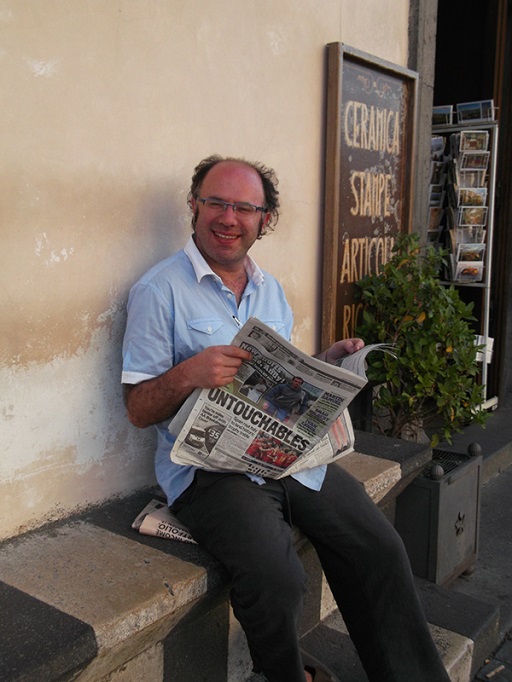
L’Idea Magazine: You started your career as a journalist and a reviewer for The Times, The Guardian, The Daily Telegraph, The Independent, The Observer, The New Statesman, e The Times Literary Supplement. That’s an impressive lot. What made you change direction?
Baret Magarian: I found that I was not so satisfied with the system of journalism that was in place when I was writing for those publications. It was of course thrilling to see my features and book reviews published in such distinguished newspapers. And I got to meet some fabulous people, including Salman Rushdie, Robert Menasse, and Peter Ustinov. But I also felt that I wasn’t really playing the journalism game very well. I did know the rules, broke them occasionally, and was sometimes ostracised as a result. In the end, I didn’t really have the stamina and sheer energy to go on as a freelance journalist – it requires superhuman levels of drive and persistence and can wear someone out. I decided also that manufacturing opinions about literary works was not something that I wanted to do forever, even if I was quite good at it. I was also looking for something else in life, though I had, and still probably have, no idea what that is.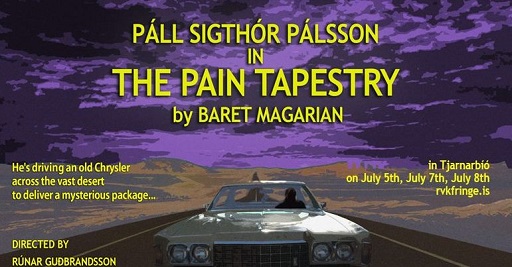
L’Idea Magazine: You also experimented in the theater world, directing avant-garde plays. What was the trigger for that decision? Did you also write plays?
Baret Magarian: Well, I have always adored the theatre and actually I’m never happier than when I am directing a stage play. I suppose I have always been in love with the idea of constructing an elaborate kind of illusion on stage for the audience to be bewitched by. Directing also represents to me a kind of prelapsarian Eden, a paradise where no one is excluded and everyone is welcome; a safe area, a realm of the senses, a place of pure creativity. To me, the stage, the lights, the auditorium, the backstage area, the curtain – they are all emblems of sheer magic. To direct a play is to be at once intensely creative and intensely sociable, working with actors, coaxing them, encouraging them, being very practical, blocking a scene out, figuring out the lighting sets. It’s a total dream job. Anyway who gets to direct for a living is immensely lucky.
I wrote a three-hour play called Josephine which was a kind of post-Checkovian soul drama and I staged it when I was writing my PhD at Durham University. The play concerns a woman who has three different relationships with three differents kinds of men – a father/mentor figure, a platonic friend and a sexualised lover. It was symbolic and complex and subtle. I remember I had a fantastic set designer, Dougal Wilson, who delivered an amazing black and white set with engulfing backdrops inspired by Munch and art nouveau. The production values and acting were quite extraordinary for a student show and the play was a great success, despite its length and complexity, but I was blessed with a really fantastic cast. In London years later I directed Moliere’s The Misanthrope in the Middle Temple Gardens during the summer. Outdoor productions like that can be immensely charming but I was aiming for something that was also challenging and a bit disconcerting – Moliere as perceived through a Strindbergian prism. I was working with a very talented costume designer who made the whole thing look like an eighteenth-century painting by Watteau, it was just ravishing. We were also working with a very gifted harpist who accompanied a set piece in which Célimene, the heroine, ties up her docile suitors in beautiful ribbons – the sequence was like a cross between a broken waltz and some piece of performance art. I also co-wrote a play called Chinese Whispers which went to the Edinburgh Fringe Festival. The play was actually written by six writers and its structure came from the game Chinese Whispers, hence the title. Performing at Edinburgh is a fantastic experience because the city is just drenched in art and every kind of cultural stimulation during the festival, and it’s a great honour to have even a small role in all that. The last piece of theatre I did before I left the Uk was a cabaret/musical called The Molotov Cocktail and it consisted of songs by Weil and Mercer and others, played on a smoky stage with back projections and mime and piano. That was tremendous fun, decadent and expressionistic, and informed by the spirit of shows like Cabaret and The Threepenny Opera.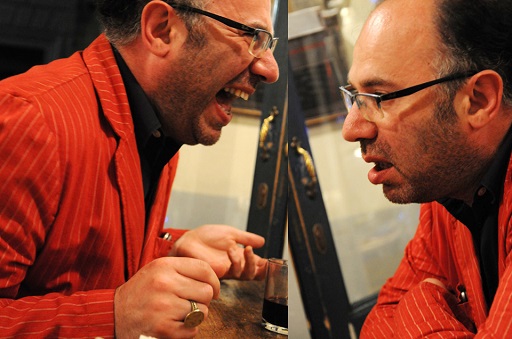
L’Idea Magazine: At this point of your life, after successfully being a journalist, a playwright and a theater director, you moved to Florence, Italy. What prompted you to move to another country and why Italy?
Baret Magarian: I felt like I badly needed a change and that the air and features of London had grown stale. I had always been drawn to Italy, its language, its beauty and the humanity and colourfulness of the Italians. I find the Italians to be for the most part very civil and polite and I also note that generally they are less ruled by money and the notion of profit than the Anglo-Saxons. I suppose I was also searching for some new kind of stimulus and new kind of experience which I probably wouldn’t have found had I remained in the Uk. I think that being away from my homeland did free me up to do things I wouldn’t ordinarily have done: I drove a scooter in Italy, I life-modelled in Italy, I learnt to drive (an Alfa Romeo), I attended a spiritual retreat in Grossetto, I recited mantras in an ashram, I mastered Italian, I re-invented myself and I crawled both in and out of my shell. Speaking a new language allowed me to become a new person, in a sense (at least temporarily). Moving to a new country is a bit like being given a second life. It’s a great privilege. But it’s not suited for everyone of course.
L’Idea Magazine: In Italy, you have been an actor, a nude model and even played guitar in bars across Tuscany, a very adventurous and diversified choice of careers. Again, why these choices, which are so diverse from your original ones?
Baret Magarian: The decision to try nude modelling was a bit crazy I confess. I became consumed by the idea that I had to nude model in order to get more confidence. The notion of doing something so literally “exposing” was bound to make me less insecure, I reasoned. I wanted to confront my fear of life and I thought that being naked in front of strangers embodied that fear most obviously. So I had to do it. Having been a nude model, though, I didn’t in the end attain that miraculous security and self-possession that I craved. But it was the most fascinating experience imaginable (for me at least). I felt a doubling in my own self: a sense that I had split into two people, the me on the podium, and the me observing me (so intense was the sense of being a magnet of attention for the students). I split into two selves. To complicate things further I was also aware of the students in turn observing me and I could even momentarily inhabit their point of view. It was hallucinatory and extraordinary, but eventually this electrified sensation resolved into something more habitual after further sessions on the podium.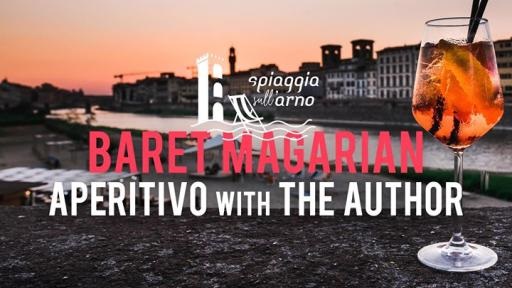
When it came to playing guitar and singing I suppose I had had some experience of playing live in front of people before – mainly when I was a student but at a certain point I really started to get into the guitar and singing and began writing songs, some of which weren’t that bad. I even recorded an album of acoustic rock songs in Bermuda, but that’s another story. I practised a lot and learnt some covers: A Space Oddity, Baby Can I hold You, Lucky, No More Shall we Part, and so on and finally I made my debut in a tiny, rather dinghy bar in Florence called Eskimino. The feedback I got was pretty positive so I started doing gigs all over the town and it was tremendously gratifying when it went well and when the audience was in tune with the spirit of my performances. I remember that once I played in a bar in Empoli and the crowd went wild. I really felt like a rock star! Regarding the acting I have only done small stuff – I did a couple of videos and trailers with the wonderful director Alessio della Valle – again great fun; I learnt how film acting is all about the precision of the face, and that understatement is the name of the game.
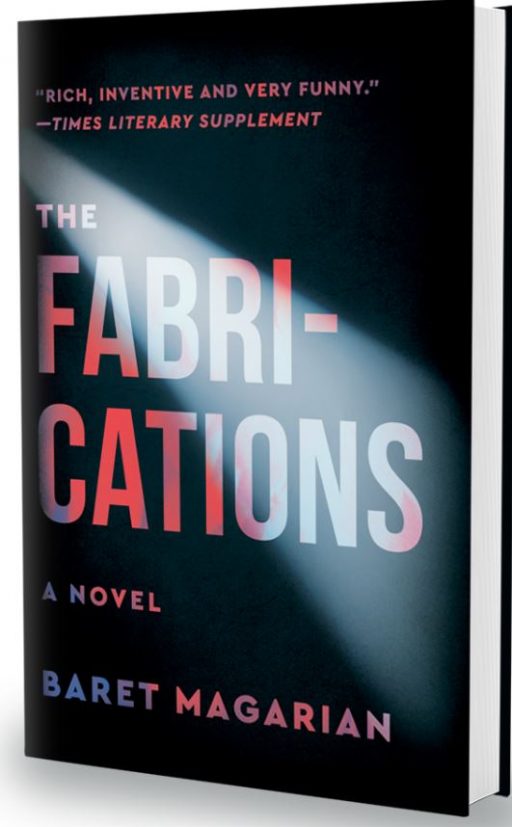 L’Idea Magazine: Your novel “The Fabrications” received a very positive response from American literary critics. Could you tell us more about this novel of yours?
L’Idea Magazine: Your novel “The Fabrications” received a very positive response from American literary critics. Could you tell us more about this novel of yours?
Baret Magarian: It’s a very ambitious production, with a vast canvas of mad characters: artists, charlatans, journalists, call girls, a fortune teller, a Hungarian millionaire, a hugely powerful spin doctor who possesses absolutely no morality… The book has a strong satirical component, being as it is a dissection of today’s media, and a more philosophical one too, in that it deals with identity, ego, and alter-ago. The story goes like this: Oscar Babel, the protagonist, wants to be a great painter, but he can’t get his act together. He asks his friend Daniel Bloch, a popular novelist, to help him and Bloch hits upon the idea of writing a story about Oscar, a fiction whose inventions might galvanise Oscar and inspire him to take control of his life. Instead, the invented details start to manifest in reality. Eventually, Oscar becomes wildly successful, not as a painter, however, but as a kind of contemporary messiah, thanks in part to the spin doctor I mentioned, whose goal is to systematically destroy and create truth… Meanwhile, Bloch’s life goes into a meltdown. The book is a meditation on art, fame, the media, identity, synchronicity, sex, and madness. I am very proud of it.
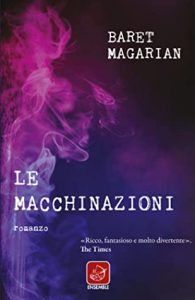 L’Idea Magazine: “Macchinazioni,” the Italian version of your book “The Fabrications,” has received a respectable number of positive reviews by various International sources, such as Il Corriere della Sera, Ansa, and Le Monde Diplomatique. It seems you really have found a ‘home’ and a proper market for your literary production in Italy…
L’Idea Magazine: “Macchinazioni,” the Italian version of your book “The Fabrications,” has received a respectable number of positive reviews by various International sources, such as Il Corriere della Sera, Ansa, and Le Monde Diplomatique. It seems you really have found a ‘home’ and a proper market for your literary production in Italy…
Baret Magarian: I have the impression that Italian readers respond more instinctively and honestly to my writing than British readers. I think also that I am perceived as a writer who has a veneer of exoticism, probably because I am a foreigner. I certainly feel that as a writer I am more appreciated in Italy than in Great Britain, which seems determined on keeping me languishing in subterranean chambers of total obscurity, as far as I can work out. But a few revered publications – The Times Literary Supplement, The Dublin Review of Books, and The New Statesman – have courageously run very favourable reviews of my work, so I haven’t given up all hope. And the wonderful British independent press SALT published my short stories last year.
When it comes to my future literary ambitions in Italy I would really like to try and get the attention of some prominent Italian critics and writers, but that is easier said than done. Having said that Le macchinazioni was selected to participate in the prestigious Premio Viareggio, which was a very great honour indeed.
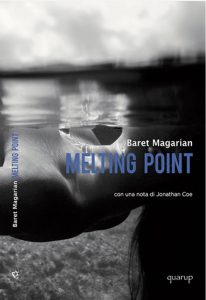 L’Idea Magazine: “Melting Point” is your Italian short stories collection. Was it originally written in Italian? What kind of themes do these stories have?
L’Idea Magazine: “Melting Point” is your Italian short stories collection. Was it originally written in Italian? What kind of themes do these stories have?
Baret Magarian: It was originally written in English and then translated into Italian but I worked on the translation with the book’s brilliant translators Elena Moncini and Andrea Sirotti. The book is a collection of fourteen very different stories, set all around the world, linked by the idea of a moment of dramatic transformation on some level: a moment in which life or a person melts, becomes “water”, metaphorically speaking. Water appears in several of the stories, in the form of the sea, and I think I was probably trying at times to imitate water’s fluidity in the prose style of the book. The book is also about how a close-up of some kind of extinction or loss can make you appreciate life more, and about how such “close-up” moments may yield or deliver precious insights. There is a great range not only in the settings but also in the characters: a deep-sea diver in Cyprus, a chef, a war journalist stationed in Iraq, a Florentine fruit and vegetable merchant, a Calabrian waitress. And they respectively find themselves grappling with a terrifying shipwreck, a bistrot with a tiny kitchen, the memories of war’s devastation, a genius toddler, and two very different lovers …
L’Idea Magazine: “La Tela del Dolore” is a monologue that was presented in Turin and Florence before reaching Reykjavik in its English version. What is this monologue about? Was it written originally in English and translated or vice versa?
Baret Magarian: Yes it was originally written in English and translated. The monologue is told by a courier who has been given the exclusive and exhausting task of driving from Lincoln, Nebraska to Los Angeles in order to hand-deliver the latest manuscript of a feted, reclusive novelist who refuses to engage with the US postal service or the Internet and has insisted that the manuscript must be delivered in person to his editor in LA. The courier finds during the interminable desert drive that the package seems to have become a living entity, at times icy cold and then boiling hot. Exhausted, he decides to spend the night in a desert motel but his state of mind is very strange, to say the least. I won’t say any more as it would spoil the rest of the story but it made for a very effective piece of theatre I have to say. Roberto Zibetti (Stealing Beauty, Pasolini) was at the helm in the Italian version and Pall Palsson (Call the Midwife, Title and Deed) in the English, and they were both extraordinarily effective in the role.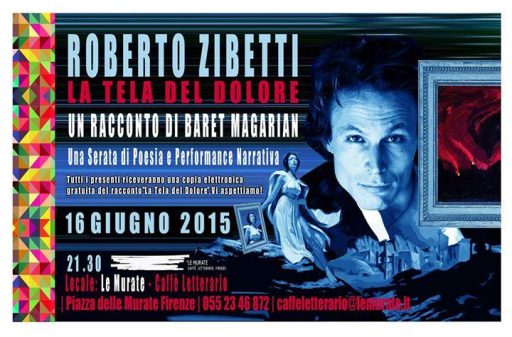
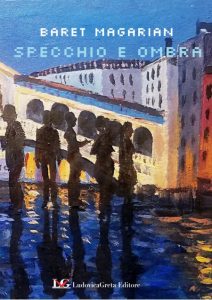 L’Idea Magazine: Your novella “Specchio e Ombra” was published in Italian. Did you write it in that language or was it translated? What is it about?
L’Idea Magazine: Your novella “Specchio e Ombra” was published in Italian. Did you write it in that language or was it translated? What is it about?
Baret Magarian: It was written in English but again I worked quite closely on the translation. The novella is rather mysterious and takes place in Venice, though the narrative moves around a lot in space and time and there are sequences in England and South Africa. The protagonist – Bryony – is a very wealthy young woman who can afford to rent an extremely luxurious apartment with a view of the Grand Canal. She invites an old friend, Egan, to stay with her and one night, after much consumption of brandy and wine, Egan confesses that he is in love with his half-sister Saskia. He proceeds to tell Bryony a shocking story about them which completely alters her view of him. They go to sleep, but the next morning Egan has disappeared and try as she might she cannot find any trace of him. She goes to the police but all her efforts to find him are in vain.
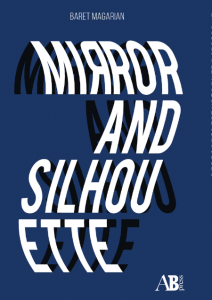 Eventually, she starts to forget about him and becomes distracted by the pleasures of Venetian life. Snatches of her privileged yet lonely upbringing in England are recalled, in particular, an episode in an aquarium with her sister Lydia when they were both little girls and glimpsed a monstrous apparition of a fish which seemed to them to be aware of their presence in an almost human way. Finally, Bryony is invited to a masked ball where she meets a stranger wearing the mask of the Plague Doctor. She finds the stranger oddly compelling and he tells her that he is hiding a hideous facial deformity behind the mask. They leave the party and go to the residence where he is staying, a strange, shapeless, cave-like place drenched in shadows and candlelight, like the beginnings of the universe…in order to find out what happens next you have to get the book!
Eventually, she starts to forget about him and becomes distracted by the pleasures of Venetian life. Snatches of her privileged yet lonely upbringing in England are recalled, in particular, an episode in an aquarium with her sister Lydia when they were both little girls and glimpsed a monstrous apparition of a fish which seemed to them to be aware of their presence in an almost human way. Finally, Bryony is invited to a masked ball where she meets a stranger wearing the mask of the Plague Doctor. She finds the stranger oddly compelling and he tells her that he is hiding a hideous facial deformity behind the mask. They leave the party and go to the residence where he is staying, a strange, shapeless, cave-like place drenched in shadows and candlelight, like the beginnings of the universe…in order to find out what happens next you have to get the book!
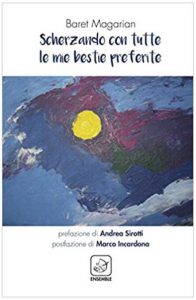 L’Idea Magazine: You also write poetry. “Scherzando con tutte le mie bestie preferite” is your last poetry book. It’s in Italian. Is there an English version? What do you write about in your poetry?
L’Idea Magazine: You also write poetry. “Scherzando con tutte le mie bestie preferite” is your last poetry book. It’s in Italian. Is there an English version? What do you write about in your poetry?
Baret Magarian: Actually the book is a bilingual edition of my poems, in both English and Italian, with two short essays by the critic and translator Andrea Sirotti and the critic and poet Marco Incardona. The poems take the reader on an intense affective and intellectual journey. I think I am trying in my poems to yoke, smash together two different worlds: one of high loftiness, and one of streetwise vulgarity and jargon, something like a marriage of lingo and sermon, prayer and curse, the squalid and the divine. I touch on love, nature, the night’s mystery, the moon, trees, the search for someone or something to unlock the enigma of existence, to tell us why we are here, to reunite us with all the lovers and friends we have lost…
Moon Bathers [from the book Scherzando con tutte le mie bestie preferite]
I’ve known the garden,
purple and pulsing with the snake-like
curtains of light of the aurora borealis;
you’re there inside its tapestry of leaves,
take me with you please.
Take me to the sorcerer in the corner
Under the creeping ivy
Under the twine of your dismantled soul
He’ll make you whole again, don’t worry.
By the statuesque sphinx in the shadow
All your lovers have been returned to you,
They are all waiting for you, with one accord,And the clouds that monitor and circle the uncertain moon
Are vermilion
There all lakes and rivers glow with quicksilver radiance
And a long line of elegant, svelte figures are supine
As they moon-bathe and it seems as if
They have been transmogrified into cool divinity.
But how long have you got left, poor paradise seeker,
For how long can you draw out and eke out those lust-grilled moments
This beauty, this music, this love, this bliss,
Where else was it that I heard its exquisite chain of noise?
L’Idea Magazine: You also compose piano music…
Baret Magarian: Yes. I have a rather weird relationship with the piano though. I am essentially a self-taught pianist, though I did take some lessons when I was eighteen. But on the whole, I just followed my own trajectory. I learnt to play by listening obsessively to the compositions of classical composers and jazz pianists. Eventually, through sheer force of will and persistence, I found I could construct something that was relatively harmonious and pleasing to the ear. Little by little, I acquired more and more soundworlds, snatches of techniques, textures, learning how to change key, to transition, to play a scale, play in octaves, etc. I can, however, only perform my own music – which is actually rather complex and tricky with complex time signatures, technical flourishes, orchestral density – and am completely unable to read music. When I first started composing music for the piano someone said it sounded like music coming from another planet! But I am totally and utterly in love with the piano and its amazing diversity of tone and colour and sheer force and power. I once played a concert grand Steinway. It was like being in heaven. A great pianist is one of the marvels of the human condition, Richter, Horowitz, Hélène Grimaud fill me with awe and jaw-dropping admiration. And Keith Jarrett is my number one idol. I saw him play once in Naples. He is the finest living musician on the planet I think. What he does at the keyboard is indistinguishable from witchcraft, hypnosis.
L’Idea Magazine: You definitely are a Renaissance Man, being that you also paint. When did you start painting and what are the themes you like the most?
Baret Magarian: I’m not really a painter, or I’m a very amateur painter.. but painting is wonderful and so sensual – so different to writing which is completely interior whereas painting is physical, involves making a mess, having fun, being like a kid, in a way… I seem to be obsessed with the notion of fires, incandescent light, transfigured landscapes… I suppose I would like to capture light and bottle it up, and let it seep into a canvas… painting is so life-affirming, vital; I find literature rather dry and fatal in comparison. A writer can disappear, be sucked into a black hole, but painting is an object, it weights you, gives you balance. Words? What are they? They don’t really exist somehow, they take flight, they are insubstantial. Paint is there, it’s like toothpaste, but at its best, it is more intoxicating than vodka, richer than caviar.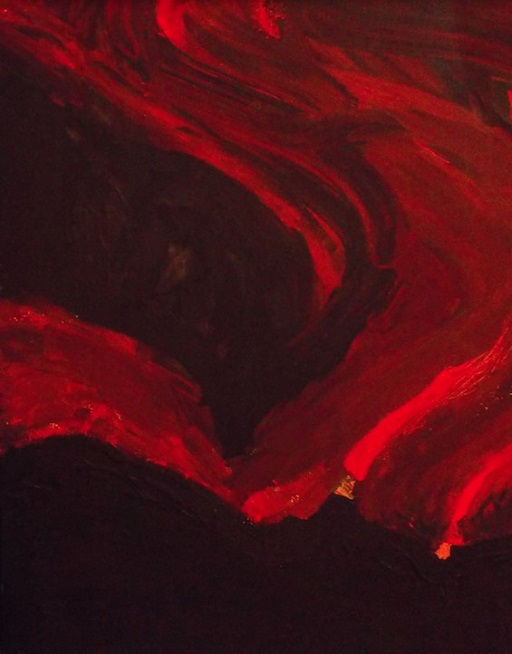
L’Idea Magazine: Are there any projects in the work at this time?
Baret Magarian: I am struggling to finish an existential noir/thriller set in the Mojave desert with a very complex time structure. It is really about three different kinds of acting: the acting which facilitates the construction of a fake persona in order to conceal a terrible secret, professional acting for the screen, and acting as something that is indistinguishable from madness and evil. I also have a set of short stories that I think could form a good collection and an idea for a novel which I hope to maybe forge a new genre for: I am calling it “campus sci-fi”. I’d also love to try and direct some theatre again, anything really, but my fantasy would be to direct something by Pinter or Buchner or Peter Shaffer. And I have an experimental play called Oxygenation – if I could get it produced in London somewhere that would be immense! But that would not be very easy, especially considering the shell-shocked state of the Uk at the present moment.
L’Idea Magazine: What makes you feel at home in Florence?
Baret Magarian: Well actually I spend a lot of time in London too, but I have to say I prefer Florence, it is easier on the soul, far less bruising, and more romantic. London spells reality, Florence is a dreamscape for the most part. I like the architecture, the relaxed pace of life, the fact that you can cycle almost everywhere, the ritual of the espresso taken at the bar, the wonderful restaurants, the colourful markets, the sunlight, the cosmic, planet-rivalling form of the Duomo, visible from almost everywhere, the presence of history, the light… And Florence is a place for misfits so it’s perfect for me.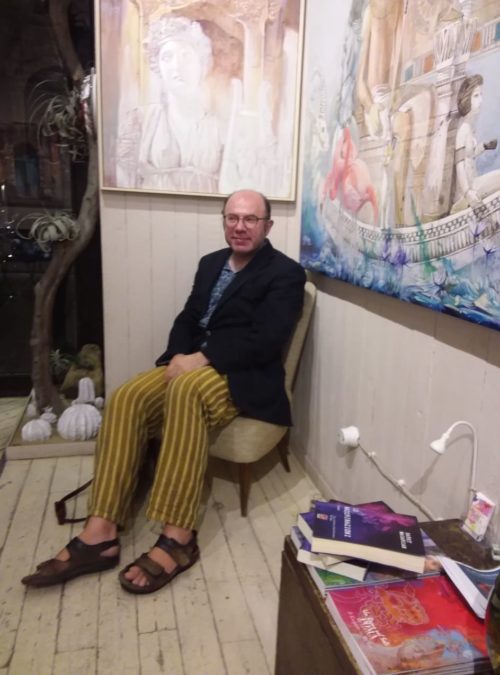
L’Idea Magazine: If you had the opportunity to meet a person from the past or the present, who would that person be and what would you like to tell them or ask?
Baret Magarian: Can I be greedy and give two candidates for both the past and the present? From the past, it would have to be Orson Welles, who was not only one of the most extraordinary artists who has ever lived but also one of the most extraordinary personalities, refined, scholarly, witty, insightful, the works. I would ask him about so many things but the most pressing question would probably be about his famous War of the World broadcast and whether or not he really expected it to elicit the reaction it did, namely, mass hysteria. From the present, I would like to meet John Pilger who is, in my mind, the most courageous, brilliant, and important journalist in the world today. He is a force of nature, an inspiration, and a total hero who has exposed single-handedly the injustices of capitalism, globalization, and Western imperialism. He is without peer or equal. I would simply ask him how he manages to be such a model of integrity in a world that no longer seems to understand or appreciate the meaning of the word.
L’Idea Magazine: Any secret wishes?
Baret Magarian: To be transported into the future, say 100 years from now, and get to ride around on a time machine without splicing into a passing asteroid or other heavenly body.
L’Idea Magazine: A message for our readers?
Baret Magarian: Life is short, art is long, the trick is to avoid bad art and make the good life last long.


